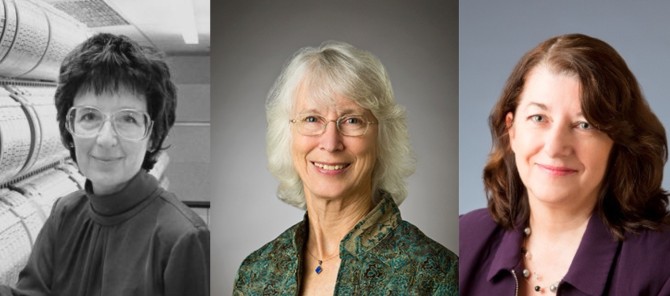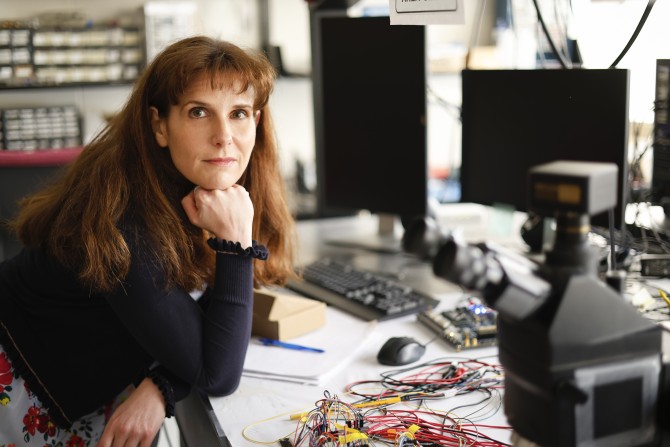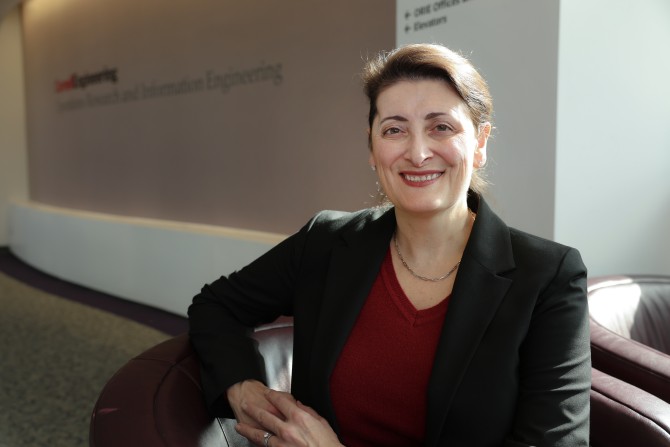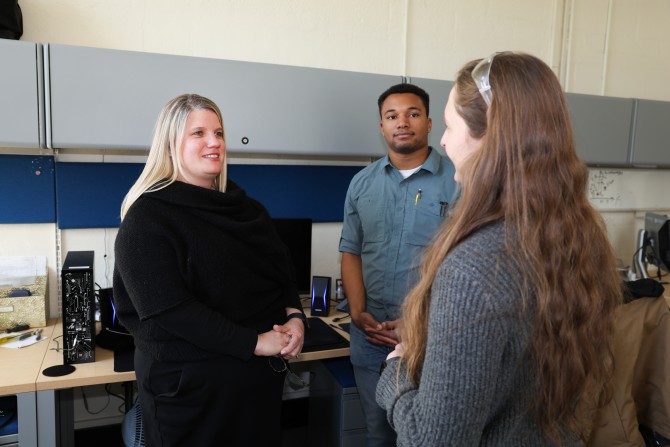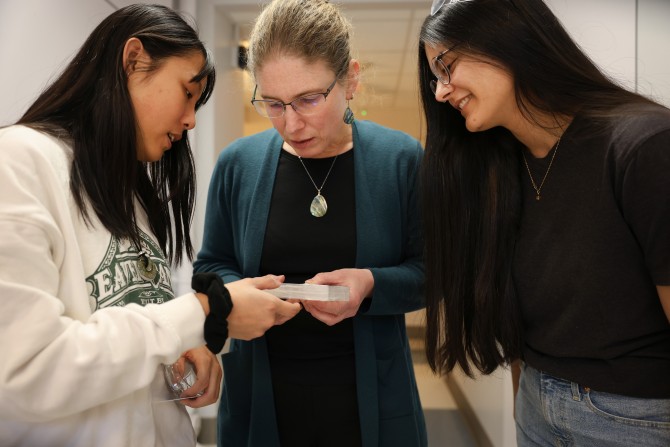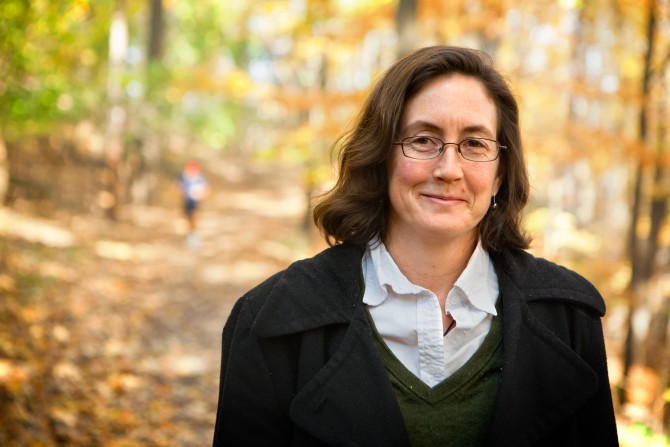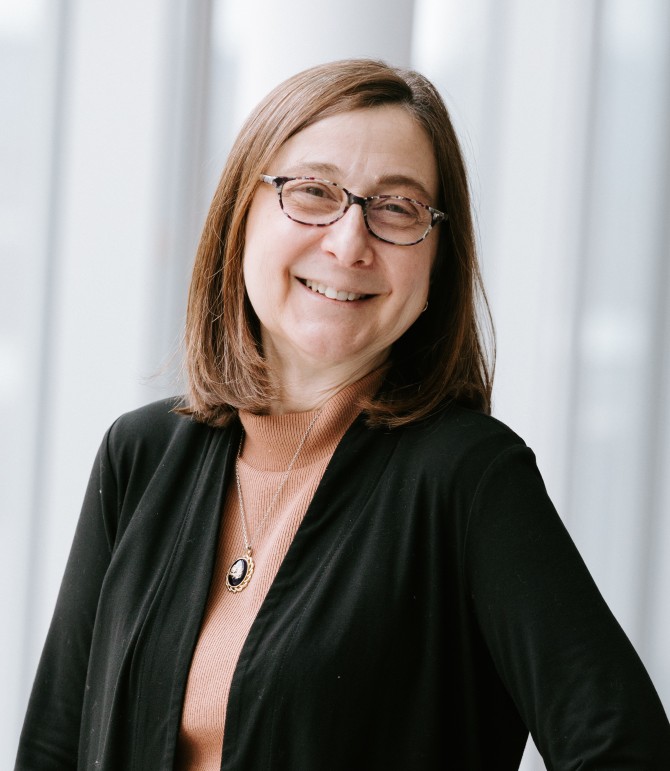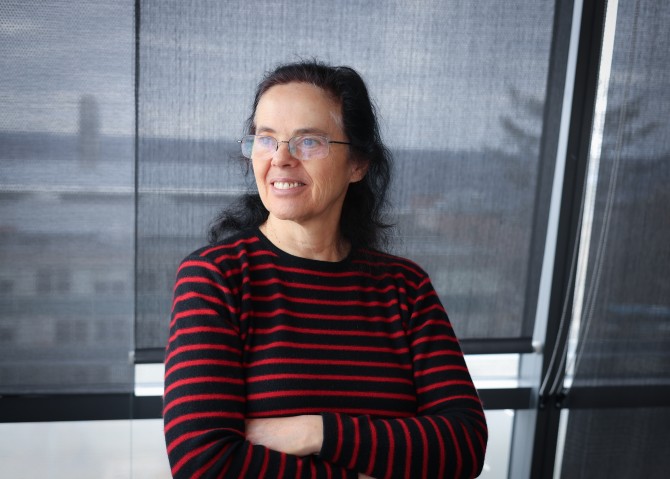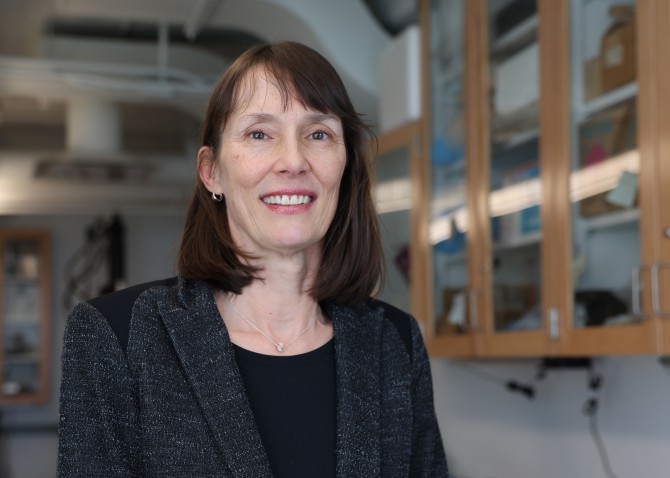
News directly from Cornell's colleges and centers
Excellence ascending: Engineering's women leadership at historic high
For the first time in Cornell Engineering’s history, every school and department currently has – or will soon have – a woman faculty member on the college’s executive leadership team. Seven of the college’s 11 schools and departments currently are led by women, with another slated to take the helm of a department in July, and half of the faculty associate deans are women.
“We have more women in leadership roles than at any other time in Cornell Engineering’s history,” said Kathryn Caggiano, Ph.D. ’98, associate dean for Master of Engineering programs. “Not only are these appointments critical to inspiring the next generation of women leaders, but also they have strengthened the fabric of our college and fostered a more inclusive and collaborative intellectual environment.”
“I often say that there has never been a better time to be a Cornell engineer,” said Lynden Archer, the Joseph Silbert Dean of Engineering. “Our college has made historic strides in lowering barriers such that any member of our community who is committed to excellence and to making a difference may pursue leadership roles in the college.
The college, which enrolled its first woman 140 years ago, has seen a dramatic acceleration of women leadership in recent decades. Christine Shoemaker became the first woman to chair a department – the Department of Environmental Engineering within the School of Civil and Environmental Engineering – in 1985. In 2001, Teresa E. Jordan became the first woman faculty member to serve as an associate dean, overseeing the college’s undergraduate programs. In 2002, Paulette Clancy was appointed director of what is now the Robert Frederick Smith School of Chemical and Biomolecular Engineering, the first woman to hold such a position.
In 2006, a proposal developed by multiple Cornell women engineers secured an ADVANCE Institutional Transformation grant from the National Science Foundation designed to increase recruitment, retention and promotion of women faculty. The grant catalyzed multiple institutional changes that helped to accelerate progress to the very outcomes we see today.
“To reach this milestone took vision, commitment, and hard work on the part of a lot of people,” said Lara Estroff, chair of the Department of Materials Science and Engineering. “It required thoughtful policy shifts to support, for example, work-life balance, and intentionally embracing a come-as-you-are culture in which students, staff and faculty are supported and celebrated for bringing their unique and diverse strengths with them to campus.”
Below are brief introductions to some of the women currently serving the college in leadership roles. Marjolein van der Meulen, the director of the Nancy E. and Peter C. Meinig School of Biomedical Engineering, and one of the ADVANCE grant authors, noted that these are not the only women leaders on the faculty. “When you become a faculty member, you become a leader,” she said. “You’re leading a research group. You’re a research leader. It’s not necessarily positional.”
Alyssa Apsel, Director of the School of Electrical and Computer Engineering and the IBM Professor of Engineering
“I certainly never thought of myself as a leader,” said Alyssa Apsel, “but I don’t like it when I see strategic mistakes being made or opportunities missed that could create problems down the road. Also, someone needs to do it.”
Apsel views her path to leadership as an organic career progression, a route that she hopes is becoming clearer to more junior women faculty as a result of having more women in leadership positions. “Women have particular challenges in engineering, and those same challenges translate to leadership roles,” she said. “We are perceived differently – especially if we are decisive or advocate for ourselves – than men who do the same thing. Some of the battle is realizing this and not letting it govern your leadership style.”
Apsel has served and continues to serve in numerous leadership roles, both for Cornell and for outside institutions, including the Institute of Electrical and Electronics Engineering. Her research lab develops high performance analog and integrated circuits and systems to extend the reach of wireless technology. She recently co-founded a company, EchoICs, that is developing revolutionary radio technology for military and other communications applications.
“Ultimately,” she said, “caring about the people around you pushes you into leadership.”
Kathryn Caggiano, Associate Dean for M.Eng. Programs and Professor of Practice in the School of Operations Research and Information Engineering
Kathryn Caggiano’s path to engineering was not a direct line, nor was her path to academic leadership. As an undergraduate at William & Mary, she changed her major at least twice before she settled on mathematics after taking an operations research course during her junior year. “Seeing how mathematical modeling and computational tools could be used to create real business value and societal benefits gave me a whole new perspective on what I wanted to do,” she said.
After three years working in technical consulting, she decided to pursue a Ph.D. in operations research at Cornell to work on more complex mathematical challenges. After graduating, she pursued opportunities in both industry and academia. She ultimately returned to Cornell in 2007, running her department’s Master of Engineering program. Under her leadership, the ORIE M.Eng. program was repeatedly selected as a finalist for the INFORMS UPS George D. Smith Prize, the field’s flagship award for effective and innovative preparation of students.
“It took many years and multiple transitions between industry and academia for me to realize that moving into professional program leadership – and away from the traditional tenure track – was the right move for me,” she said, crediting the mentors she had on her journey. “Throughout that process, those key relationships endured and evolved.”
Caggiano said that she believes the most successful leaders put intentional practices into place to recognize and cultivate talent. “I would encourage every young person who is interested in engineering, and willing to work hard, to go for it,” she said. “There are so many different ways to have a positive impact, and every path is different. Don’t follow anyone’s path but your own.”
Susan Daniel, the William C. Hooey Director of the Robert Frederick School of Chemical and Biomolecular Engineering and the Fred H. Rhodes Professor
"I am motivated by knowing that my work will impact something in the future in a practical way,” said Susan Daniel. “That's not to say I don't do fundamental research, but even doing work that is specific to an esoteric part of a particular problem that only those in my field may truly understand, I always think about how what I learn connects to the rest of us.”
Much of Daniel’s research focuses on the function of a small portion of the spike protein on coronaviruses, something she began studying years before the COVID-19 pandemic made it a matter of widespread global interest. She credits much of her professional success to her ability to recognize and remain open to new approaches and collaborations that have the potential to make a difference. “You have to start somewhere,” she said. “As a young assistant professor, I was not of the mind that someday I was going to be sitting in this corner office. I wasn't even sure I was going to get tenure.”
Paulette Clancy, the first woman to lead what is now the R.F. Smith School, helped to guide Daniel, as did Lynden Archer, Clancy’s successor in the role and the current Joseph Silbert Dean of Engineering. Watching their success as leaders, although neither of them was from a traditional background, inspired Daniel.
“They made it feel possible,” she said. “Even though I was not conscientiously thinking this at the time, in the back of my mind I knew that if they could be there, were respected and highly successful as leaders, why couldn’t I be there one day, too.”
In 2021, about 14 years after arriving at Cornell, Daniel was named the leader of the Smith School, a position that helps to ensure that her work outside the lab – like her research in it – has a tangible impact.
“One way you can affect change is to be in a position of power that can make the change. To do that, you have to progress into the leadership position. Making sure we are training the next generation of women, first-generation college degree holders, people from backgrounds traditionally underrepresented, and so on, is important to ensure that our leadership reflects the diversity we have achieved in our student body and in our society.”
Lara Estroff, Chair of the Department of Materials Science and Engineering and the Herbert Fisk Johnson Professor of Industrial Chemistry
Lara Estroff benefited from good mentors and strong networks in her career, something that she – as the first female chair of her department – intentionally provides and encourages among her colleagues. “It’s in the strong ties of professional networks that future leaders have access to people we can pull on, hear multiple opinions from and see the diversity of approaches to getting things done,” said Estroff, who joined Cornell in 2005 as an assistant professor.
Now, leading a research group focused on bio-inspired materials synthesis, Estroff has used those networks to build active research collaborations with colleagues in the Meinig School of Biomedical Engineering, the School of Applied and Engineering Physics, and others. “That’s just how I work, and Cornell fosters that,” she said.
The first grant for one of her most enduring and impactful collaborations – which is with Claudia Fischbach, the Stanley Bryer 1946 Professor of Biomedical Engineering – was written in the library of a local daycare, where Estroff had to stay close by as her infant son acclimated to the new environment. “I asked Claudia, ‘Why don’t we just meet there? You’re dropping off, and I have to be here anyway.’ And that started 15 years of funding.”
The collaboration between Fischbach and Estroff focuses on the relationship between bone growth and breast cancer. While many men also research breast cancer, Estroff said, “When you have women doing the research and women teaching, there’s an inherently different perspective that brings value to a complex science that predominantly affects women. So, I think that’s really important and it’s influencing the future of research.”
Estroff is encouraged by the ways in which faculty are increasingly able to incorporate having a family into their career, rather than choose between the two. As an example, she noted that one of her Ph.D. students had two kids while going through the program. “And her kids were like part of the family,” she said. “That’s not a picture that you would have seen 15 or 20 years ago, so that really does give me hope, in that I’ve professionally contributed to and seen real societal change happen around women in engineering.”
Natalie Mahowald, incoming Chair of the Department of Earth and Atmospheric Sciences and the Irving Porter Church Professor in Engineering
Natalie Mahowald did not meet a woman atmospheric science professor until she was four years into her graduate degree. When she assumes the leadership of her department in July 2024, she will become the second woman to hold the position.
“I think that role models are important, which is part of the reason I’m willing to be in a leadership position,” said Mahowald, who has also served as director of undergraduate studies, director of graduate studies, and faculty director for the Cornell Atkinson Center, among other leadership positions.
Mahowald was a lead author on the influential “Special Report on Global Warming of 1.5 Degrees Celsius” from the United Nations' Intergovernmental Panel on Climate Change in 2018. She is a go-to source for issues relating to air pollution and climate issues, which she researches using fluid dynamics, thermodynamics and computer modeling.
In addition to research, she also enjoys the part of her job that is focused on teaching. “I love when that light bulb goes off and students get excited about these issues,” she said.
“Cornell is a great place to be a woman in engineering,” Mahowald said, “as the university is so supportive of faculty and students in engineering.”
Lois Pollack, Associate Dean for Research and Graduate Studies and the John Edson Sweet Professor of Engineering in the School of Applied and Engineering Physics
Having previously served as director of undergraduate studies and then director of the School of Applied and Engineering Physics, Lois Pollack is an experienced leader who believes in the power of giving back. “In all honesty, I enjoy service, whether it’s participating on committees or leading a unit,” she said. “I love working with people and it’s especially gratifying when I feel that I’ve had a positive impact and helped someone else.”
Pollack first came to Cornell as a postdoctoral scholar in 1989, and she joined the faculty of the School of Applied and Engineering Physics in 2000. As a scholar, she has always tried to remain flexible, beginning her career in physics, then switching her focus to biophysics, and eventually adding engineering to the mix. Her research focuses on building tools and designing instruments for novel, time-resolved studies of proteins, RNA and DNA.
She honed her leadership skills through the training and support provided from other women in Cornell Engineering and through Cornell’s ADVANCE Center. “I really enjoyed those workshops, not just for what I learned but also for the community ADVANCE built,” she said. “It’s so much easier to reach out to someone you already know for help with a problem. I still remember and pass along tips I learned from those trainings.”
One of the aspects of leadership Pollack particularly relishes is passing along positive feedback. “Quite often,” she said, “we only get feedback when we’ve done something wrong, but I believe in letting people know when they’ve done a great job, as well.”
Éva Tardos, Chair of the Department of Computer Science in the Cornell Bowers College of Computing and Information Science and the Jacob Gould Schurman Professor of Computer Science
Éva Tardos is currently serving in a second term as chair of the rapidly growing Department of Computer Science, now housed in the Cornell Bowers College of Computing and Information Science. She previously helmed the department from 2006 to 2010.
Tardos views her leadership positions, which also include numerous leadership roles in the scientific community, as opportunities to serve and to help her community make an impact in important and influential areas.
In her own research – which focuses on the design of efficient algorithms and the interface of economics and computing – her impact has been profound, particularly on problems related to routing in networks. She has been elected to the National Academy of Engineering, the National Academy of Sciences, the American Academy of Arts and Sciences, and the American Philosophical Society.
“We need to do a better job to encourage women to consider science as a career,” Tardos said. “As I started this career, I got a lot of encouragement from my mentors. Without this encouragement, I would have never even tried research as a career path.”
Marjolein van der Meulen, the James M. and Marsha McCormick Director of the Nancy E. and Peter C. Meinig School of Biomedical Engineering and the Swanson Professor of Biomedical Engineering
“The fact that you could help people, do something good for people, is why I wanted to be an engineer,” said Marjolein van der Meulen, a leading researcher on the mechanical properties of musculoskeletal tissues. Throughout her career, which includes a recent stint as president of the Orthopaedic Research Society, van der Meulen has been a relentless and innovative pioneer, helping to establish and expand programs to support faculty. She has a long track record of championing women in engineering, including professional society awards for women’s leadership and advancement.
Having joined Cornell Engineering in 1996 as one of two women faculty members in the Sibley School of Mechanical and Aerospace Engineering, van der Meulen has witnessed the demographic changes in the college first-hand. “I believe there is great strength in numbers,” she said. “Finding that commonality is really important, because that’s where you find the things you have to work on. Numbers also give you a voice that is actually heard.”
When asked what she would say about how to improve pathways and the overall environment for women faculty, van der Meulen cautioned against pushing women into leadership roles too early. “It happens in a lot of places. They push more with women and underrepresented individuals, because there’s fewer of us and they’re trying to get us at the table. However, this approach can hinder our ability to first establish a strong scientific reputation, ultimately diminishing our potential for excellence in either role.”
She also stressed the importance of increasing the recognition and visibility of Cornell’s rich history of women in engineering, noting that no engineering buildings and only a few professorships are currently named for women. “We need to do better,” she said. “We need to continue to strive toward equal representation in named professorships, service on advisory councils for all engineering departments, and for recognition with faculty and alumnae achievement awards at Cornell. This is important not only to recognize the invaluable contributions of pioneers and their groundbreaking careers, but also as a source of inspiration for current and future generations.”
Kathryn Henion and Reeve Hamilton contributed to this article.
Media Contact
Get Cornell news delivered right to your inbox.
Subscribe